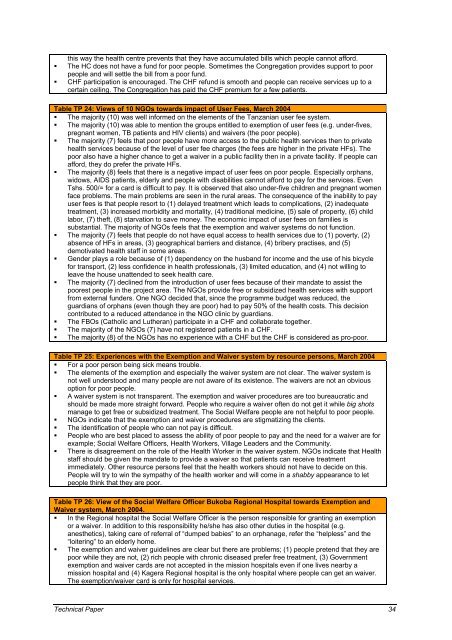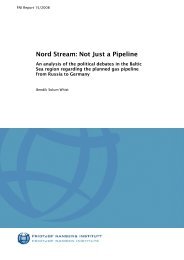equity implications of health sector user fees in tanzania
equity implications of health sector user fees in tanzania
equity implications of health sector user fees in tanzania
Create successful ePaper yourself
Turn your PDF publications into a flip-book with our unique Google optimized e-Paper software.
this way the <strong>health</strong> centre prevents that they have accumulated bills which people cannot afford.<br />
� The HC does not have a fund for poor people. Sometimes the Congregation provides support to poor<br />
people and will settle the bill from a poor fund.<br />
� CHF participation is encouraged. The CHF refund is smooth and people can receive services up to a<br />
certa<strong>in</strong> ceil<strong>in</strong>g. The Congregation has paid the CHF premium for a few patients.<br />
Table TP 24: Views <strong>of</strong> 10 NGOs towards impact <strong>of</strong> User Fees, March 2004<br />
� The majority (10) was well <strong>in</strong>formed on the elements <strong>of</strong> the Tanzanian <strong>user</strong> fee system.<br />
� The majority (10) was able to mention the groups entitled to exemption <strong>of</strong> <strong>user</strong> <strong>fees</strong> (e.g. under-fives,<br />
pregnant women, TB patients and HIV clients) and waivers (the poor people).<br />
� The majority (7) feels that poor people have more access to the public <strong>health</strong> services then to private<br />
<strong>health</strong> services because <strong>of</strong> the level <strong>of</strong> <strong>user</strong> fee charges (the <strong>fees</strong> are higher <strong>in</strong> the private HFs). The<br />
poor also have a higher chance to get a waiver <strong>in</strong> a public facility then <strong>in</strong> a private facility. If people can<br />
afford, they do prefer the private HFs.<br />
� The majority (8) feels that there is a negative impact <strong>of</strong> <strong>user</strong> <strong>fees</strong> on poor people. Especially orphans,<br />
widows, AIDS patients, elderly and people with disabilities cannot afford to pay for the services. Even<br />
Tshs. 500/= for a card is difficult to pay. It is observed that also under-five children and pregnant women<br />
face problems. The ma<strong>in</strong> problems are seen <strong>in</strong> the rural areas. The consequence <strong>of</strong> the <strong>in</strong>ability to pay<br />
<strong>user</strong> <strong>fees</strong> is that people resort to (1) delayed treatment which leads to complications, (2) <strong>in</strong>adequate<br />
treatment, (3) <strong>in</strong>creased morbidity and mortality, (4) traditional medic<strong>in</strong>e, (5) sale <strong>of</strong> property, (6) child<br />
labor, (7) theft, (8) starvation to save money. The economic impact <strong>of</strong> <strong>user</strong> <strong>fees</strong> on families is<br />
substantial. The majority <strong>of</strong> NGOs feels that the exemption and waiver systems do not function.<br />
� The majority (7) feels that people do not have equal access to <strong>health</strong> services due to (1) poverty, (2)<br />
absence <strong>of</strong> HFs <strong>in</strong> areas, (3) geographical barriers and distance, (4) bribery practises, and (5)<br />
demotivated <strong>health</strong> staff <strong>in</strong> some areas.<br />
� Gender plays a role because <strong>of</strong> (1) dependency on the husband for <strong>in</strong>come and the use <strong>of</strong> his bicycle<br />
for transport, (2) less confidence <strong>in</strong> <strong>health</strong> pr<strong>of</strong>essionals, (3) limited education, and (4) not will<strong>in</strong>g to<br />
leave the house unattended to seek <strong>health</strong> care.<br />
� The majority (7) decl<strong>in</strong>ed from the <strong>in</strong>troduction <strong>of</strong> <strong>user</strong> <strong>fees</strong> because <strong>of</strong> their mandate to assist the<br />
poorest people <strong>in</strong> the project area. The NGOs provide free or subsidized <strong>health</strong> services with support<br />
from external funders. One NGO decided that, s<strong>in</strong>ce the programme budget was reduced, the<br />
guardians <strong>of</strong> orphans (even though they are poor) had to pay 50% <strong>of</strong> the <strong>health</strong> costs. This decision<br />
contributed to a reduced attendance <strong>in</strong> the NGO cl<strong>in</strong>ic by guardians.<br />
� The FBOs (Catholic and Lutheran) participate <strong>in</strong> a CHF and collaborate together.<br />
� The majority <strong>of</strong> the NGOs (7) have not registered patients <strong>in</strong> a CHF.<br />
� The majority (8) <strong>of</strong> the NGOs has no experience with a CHF but the CHF is considered as pro-poor.<br />
Table TP 25: Experiences with the Exemption and Waiver system by resource persons, March 2004<br />
� For a poor person be<strong>in</strong>g sick means trouble.<br />
� The elements <strong>of</strong> the exemption and especially the waiver system are not clear. The waiver system is<br />
not well understood and many people are not aware <strong>of</strong> its existence. The waivers are not an obvious<br />
option for poor people.<br />
� A waiver system is not transparent. The exemption and waiver procedures are too bureaucratic and<br />
should be made more straight forward. People who require a waiver <strong>of</strong>ten do not get it while big shots<br />
manage to get free or subsidized treatment. The Social Welfare people are not helpful to poor people.<br />
� NGOs <strong>in</strong>dicate that the exemption and waiver procedures are stigmatiz<strong>in</strong>g the clients.<br />
� The identification <strong>of</strong> people who can not pay is difficult.<br />
� People who are best placed to assess the ability <strong>of</strong> poor people to pay and the need for a waiver are for<br />
example; Social Welfare Officers, Health Workers, Village Leaders and the Community.<br />
� There is disagreement on the role <strong>of</strong> the Health Worker <strong>in</strong> the waiver system. NGOs <strong>in</strong>dicate that Health<br />
staff should be given the mandate to provide a waiver so that patients can receive treatment<br />
immediately. Other resource persons feel that the <strong>health</strong> workers should not have to decide on this.<br />
People will try to w<strong>in</strong> the sympathy <strong>of</strong> the <strong>health</strong> worker and will come <strong>in</strong> a shabby appearance to let<br />
people th<strong>in</strong>k that they are poor.<br />
Table TP 26: View <strong>of</strong> the Social Welfare Officer Bukoba Regional Hospital towards Exemption and<br />
Waiver system, March 2004.<br />
� In the Regional hospital the Social Welfare Officer is the person responsible for grant<strong>in</strong>g an exemption<br />
or a waiver. In addition to this responsibility he/she has also other duties <strong>in</strong> the hospital (e.g.<br />
anesthetics), tak<strong>in</strong>g care <strong>of</strong> referral <strong>of</strong> “dumped babies” to an orphanage, refer the “helpless” and the<br />
“loiter<strong>in</strong>g” to an elderly home.<br />
� The exemption and waiver guidel<strong>in</strong>es are clear but there are problems; (1) people pretend that they are<br />
poor while they are not, (2) rich people with chronic diseased prefer free treatment, (3) Government<br />
exemption and waiver cards are not accepted <strong>in</strong> the mission hospitals even if one lives nearby a<br />
mission hospital and (4) Kagera Regional hospital is the only hospital where people can get an waiver.<br />
The exemption/waiver card is only for hospital services.<br />
Technical Paper 34













